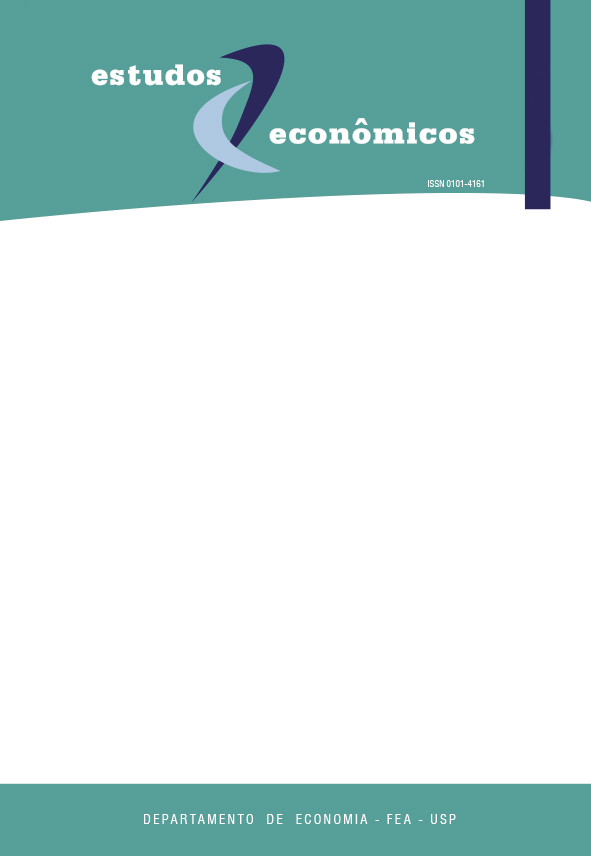A influência da opção religiosa na acumulação de capital humano: um estudo exploratório
DOI:
https://doi.org/10.1590/S0101-41612004000300003Keywords:
Religion, family structure, fertility, human capitalAbstract
This article explores Brazilian official statistics on religion, in particular 1980 and 1991 Census and 1988 PNAD special survey. It searches for stylized facts of economics of religion summarized in Iannaccone (1998). The papers main question is to test an empirical relation between the parents religious affiliation and the children performance at school. This relation may indicate the existence a causal relation between religion and families human capital accumulation. Results indicate that Brazilian data reproduces most of stylized facts and the existence of differences in children schooling among selected religious groups persist after controlling for socio-economic factors.Downloads
References
AZZI, C.; EHRENBERG. R. Household allocation of time and church attendance. Journal of Political Economy, Chicago, v. 83, n. 1, p. 27- 56, 1975.
BECKER G. S.; LANDES E. M.; MICHAEL R. T. An economic analysis of marital instability. Journal of Political Economy, Chicago, v. 85, n. 6, p. 1141-1187, 1977.
BECKER, G. S.; LEWIS G. H. On the interaction between the quantity and quality of children. Journal of Political Economy, Chicago, v. 81, p. 279-288, 1973.
CAMARGO, C. P. F. Kardecismo e umbanda: uma interpretação sociológica. São Paulo: Pioneira, 1961.
EHRENBERG. R. Household allocation of time and religiosity: replication and extension. Journal of Political Economy, Chicago, v. 85, n. 2, p. 415-423, 1977.
FEATHERMAN, D. L. The socioeconomic achievement of white religioethnic subgroups: social and psychological explanations. American Sociological Review, v. 36, p. 207-222, abril 1971.
FINKE, R. The consequences of religious competition. In: YOUNG, Lawrence (org.), Rational choice theory and religion. Nova Iorque: Routledge, 1997.
IANNACCONE, L. Introduction to the economics of religion. Journal of Economic Literature, v. 36, n. 3, p. 1465-1496, setembro 1998.
LEIBOWITZ, A .Home investments in children. Journal of Political Economy, v. 82, n. 2, p. 111-131, março/abril 1974.
LENSKI, G. E. Social correlates of religious interest. American Sociological Review, v. 18, p. 533-544, outubro 1953.
MACHADO, M. D. C. Carismáticos e pentecostais: adesão religiosa na esfera familiar. 1996. Tese (Doutorado). São Paulo: ANPOCS.
RAZIN, A.; SADKA, E. Population economics. Massachusetts: The MIT Press, 1995.
STARK R.; IANNACCONE, L.; FINKE, R. Religion, science and rationality. American Economic Review, v. 86, n. 2, p. 433-437, 1996.
TODARO, M. P. Economic development in the third world. 4ª ed. Longman, 1988.
WEBER, M. A ética protestante e o espírito do capitalismo. 11ª ed. São Paulo: Pioneira, 1996.
YOUNG, L. Rational choice theory and religion. Nova Iorque: Routledge, 1997.
Downloads
Published
Issue
Section
License
Copyright (c) 2004 rancisco Anuatti-Neto, Renata Del Tedesco Narita

This work is licensed under a Creative Commons Attribution-NonCommercial 4.0 International License.
By submitting an article, the author authorizes its publication and attests that it has not been submitted to any other journal. The original article is considered final. Articles selected for publication are proofread for grammatical and orthographic errors. The journal does not pay rights for published articles. The Institute of Economic Research from the School of Economics, Business and Accounting of the University of São Paulo (Instituto de Pesquisas Econômicas da Faculdade de Economia, Administração e Contabilidade da Universidade de São Paulo) owns the journal's copyright.





 Atualizado em 14/08/2025
Atualizado em 14/08/2025